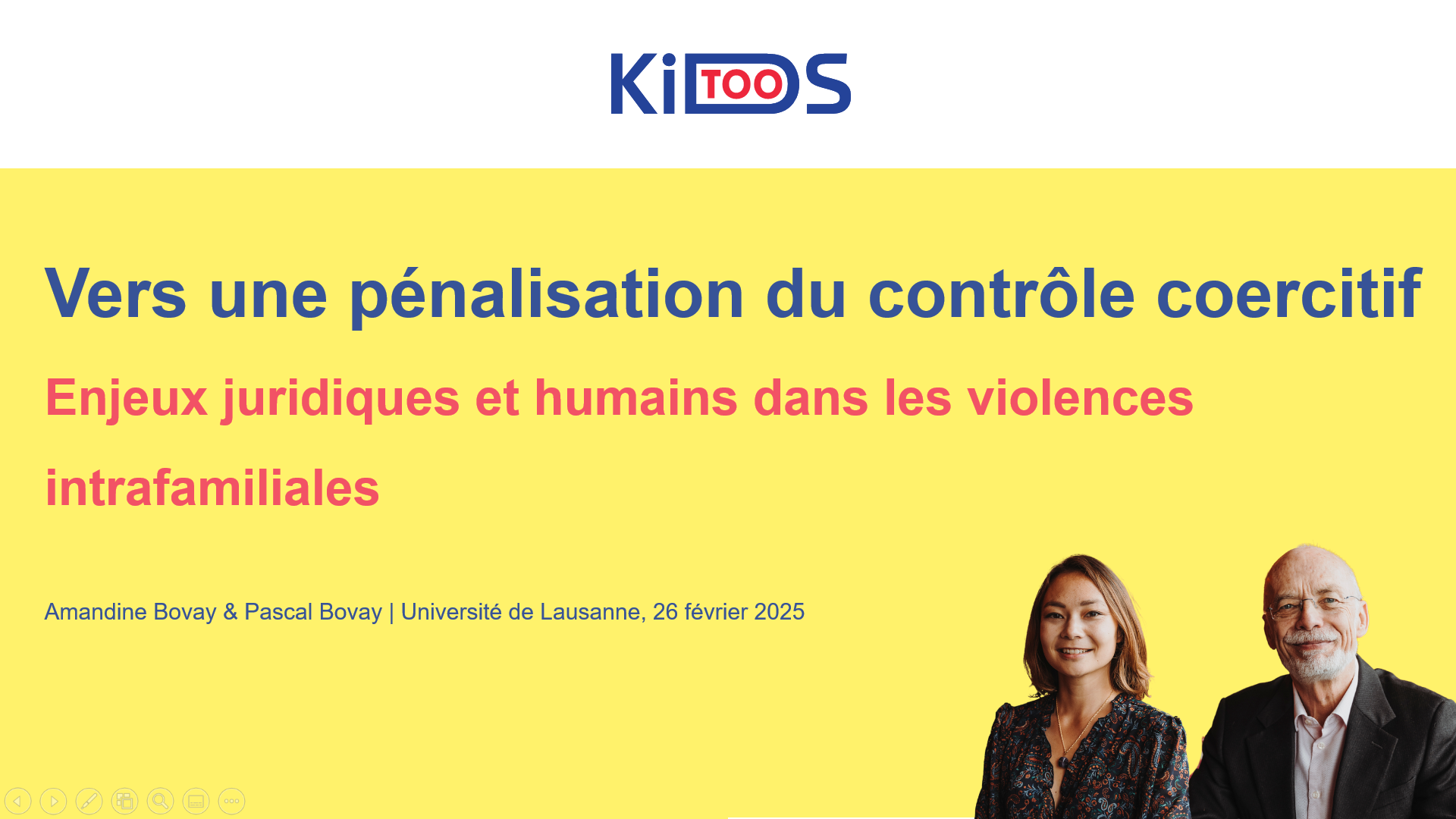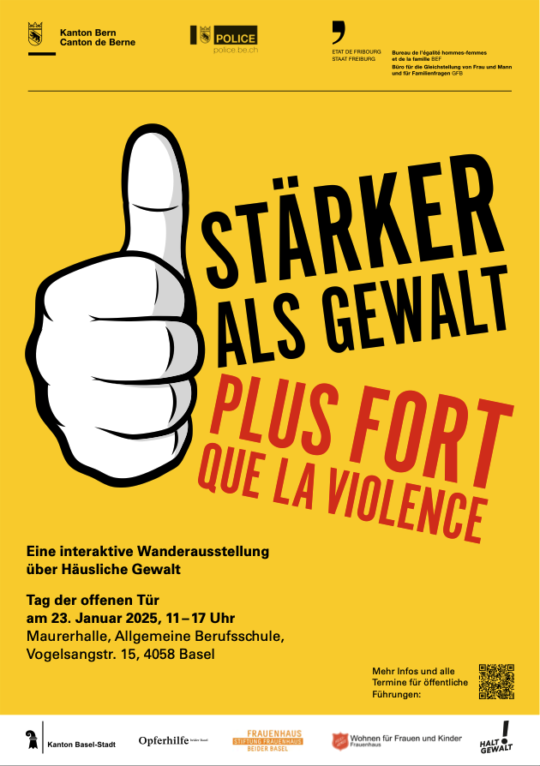KidsToo a eu l’occasion d’intervenir dans le cours de droit pénal de l’Université de Lausanne pour une présentation intitulée « Vers une pénalisation du contrôle coercitif : Enjeux juridiques et humains dans les violences intrafamiliales ».
Un immense merci à la Professeure Perrier-Depeursinge pour cette opportunité précieuse d’échanger avec les étudiant·e·s en droit.
Sensibiliser et former les futurs acteurs judiciaires est essentiel pour mieux identifier, comprendre et lutter contre les mécanismes des violences intrafamiliales. Une justice informée est une justice plus protectrice.

Journée internationale des droits des femmes
En cette journée particulière, nous célébrons les avancées dans la lutte contre les violences domestiques en Suisse. Si le chemin reste long et les défis immenses, il est essentiel de reconnaître et d’applaudir chaque progrès, chaque engagement, chaque victoire – grande et petite.
Nous saluons toutes les personnes qui, chaque jour, se battent pour cette cause. Chacun.e d’entre nous peut agir : en écoutant, en dénonçant, en sensibilisant. Ensemble, nous faisons la différence. ✊
Découvrez quelques avancées récentes en Suisse ⬇️
Aujourd’hui, à 2 jours de la journée internationale des droits des femmes, Jacqueline de Quattro a déposé une motion demandant au Conseil fédéral d’élaborer une modification de la loi afin d’introduire la notion de contrôle coercitif dans le code pénal et le code civil.
Le contrôle coercitif inclut des comportements répétés et insidieux tels que l’imposition de règles strictes, le contrôle des ressources financières ou encore l’isolement social et psychologique. Ces comportements constituent un schéma de domination aux conséquences graves pour les victimes.
Lire la motion ➡️ https://www.parlament.ch/fr/ratsbetrieb/suche-curia-vista/geschaeft?AffairId=20253062
L’introduction du contrôle coercitif dans la loi permettra de protéger davantage les victimes de violences domestiques qui sont principalement des femmes et des enfants.
Kidstoo collabore étroitement avec différents partenaires, dont les politiques, pour faire avancer les droits des victimes et principalement des enfants.

Le terme “homicide” vient du latin homo, qui signifie “homme” au sens générique. Pourtant, toutes les victimes ne sont pas des hommes. Dans la version allemande du Code pénal suisse, on parle de Tötung (mise à mort), une approche neutre qui pourrait inspirer une réforme.
➡️ Pourquoi ne pas adopter une terminologie plus inclusive ?
➡️ Comment mieux protéger les victimes de violences liées au genre ?
Une proposition : intégrer un article 112a pour reconnaître explicitement ces crimes et éviter les réductions de peine injustifiées.
Découvrez notre dernière newsletter sur le sujet: https://www.kidstoo.ch/feminicide-humanicide-genricide/
Version DE: https://www.kidstoo.ch/de/feminizid-humanizid-genozid/
Féminicides et armes à feu en Suisse : quelle réponse politique ?
En 2019, la conseillère nationale Maya Graf a déposé le postulat 19.3618, demandant une analyse complète des féminicides en Suisse, incluant les profils des victimes et des auteurs, ainsi que les facteurs et circonstances de ces crimes.
Suite à l’adoption du postulat, le Bureau fédéral de l’égalité entre femmes et hommes (BFEG) a publié une étude basée sur les données du Swiss Homicide Monitor et de la Statistique policière de la criminalité. Elle confirme le rôle central des armes à feu dans les homicides domestiques.
Et maintenant ?
Cette étude recommande de :
– Renforcer les mesures de prévention, notamment pour les personnes âgées.
– Améliorer la collaboration entre les autorités, les hôpitaux et les institutions de soins.
– Améliorer la collecte et la documentation des données relatives aux armes à feu.
– Mettre sous séquestre les armes à feu dès l’apparition des premiers signes d’alerte, en application de l’art. 31 de la loi sur les armes.
📌 Sources :
🔹 Postulat: https://www.parlament.ch/fr/ratsbetrieb/suche-curia-vista/geschaeft?AffairId=20193618
🔹 Rapport du Conseil fédéral : https://www.parlament.ch/centers/eparl/curia/2019/20193618/Bericht%20BR%20F.pdf
🔹 Étude du BFEG: https://www.kidstoo.ch/app/uploads/BFEG_homicides_domestiques_armes_FR_Fevrier2025.pdf
🔹 Article du 24 Heures : https://www.24heures.ch/violences-domestiques-les-meurtres-par-arme-a-feu-une-affaire-dhommes-144985823283
Droit de la famille: aspects pénaux
Résumé:
Bien que les modes amiables soient à juste titre favorisés, les séparations se règlent encore fréquemment dans le cadre de procédures litigieuses. Sur le plan judiciaire, le paroxysme du conflit se traduit en règle générale par une extension du litige au-delà de sa dimension civile. Il arrive en effet qu’une autorité pénale soit saisie, par exemple par une partie ou par l’autorité de protection de l’enfant. En droit de la famille, le contentieux pénal revêt de nombreuses facettes. Cette édition consacrée aux aspects pénaux propose une revue de quelques infractions typiques rencontrées dans la pratique par thème. Il est également question d’offrir des réflexions en matière de représentation de l’enfant et de protection des victimes de violence conjugale afin de faciliter le travail des praticiens….
Auteur:
Loïc Parein est docteur en droit et avocat spécialiste FSA droit pénal. Après avoir exercé comme substitut du Procureur général du canton de Vaud en 2008 et 2009 et comme greffier au Tribunal d’arrondissement de Lausanne en 2010, il obtient son brevet d’avocat en 2012 puis son titre d’avocat spécialiste FSA droit pénal en 2019. Dans le cadre de son activité au sein de son étude Avocats-ch à Lausanne, il assiste les personnes impliquées dans des procédures pénales – qu’il s’agisse d’accusés, de victimes, de tiers séquestrés, de témoins, etc. – dans l’exercice de leur droit d’être entendu. En matière de conseil, il accompagne les entreprises et les institutions (fondation, foyer, école, etc.) dans la gestion des problèmes (décès, accident, conflit, harcèlement, accusation, etc.) susceptibles d’avoir une incidence sur le plan judiciaire. Du point de vue académique, Loïc Parein est actuellement chargé de cours à l’Université de Lausanne, où il dispense un séminaire sur le rapport entre le droit pénal et la littérature, ainsi qu’à l’Université de Fribourg, où il enseigne le droit pénal des mineurs. Il intervient également régulièrement lors de formations continues et est auteur et éditeur de nombreuses publications en droit pénal.
Éditeur: Stämpfli Editions
Source: www.payot.ch
La newsletter de février 2025 est disponible ici.
Le contrôle coercitif rentre dans le code pénal français
L’amendement adopté en France en janvier de cette année définit le contrôle coercitif comme tel «propos ou comportements répétés ou multiples, portant atteinte aux droits et libertés fondamentaux de la victime, ou instaurant chez elle un état de peur ou de contrainte dû à la crainte d’actes exercés directement ou indirectement sur elle-même ou sur autrui, que ces actes soient physiques, psychologiques, économiques, judiciaires, sociaux, administratifs, numériques, ou de toute autre nature».
Un code pénal suisse non inclusif ?
On trouve dans les versions française, italienne et anglaise le terme d’homicide dont l’origine latine se rapport à l’homme. Dans la version allemande, il n’y a pas de référence que ce soit à l’homme (Mann, männlich) ou à l’humain (Mensch). Le terme utilisé en allemand est « Tötung » qui pourrait être traduit dans le code pénal en français par « Mise à mort », en italien par « Uccidere » et en anglais par « Killing ».
L’avantage des formulations non-genrées proposées pour les versions FR, IT et EN serait de supprimer toute référence à un genre spécifique.
Nouvel article 112a CP
Le fait d’utiliser les termes proposés ci-dessus pourrait :
- Permettre d’inscrire une infraction pour les mises à mort liées aux genres ou à
l’encontre de sa/son conjoint.e/partenaire ou ex-conjoint.e/partenaire par un
nouvel article 112a. - Empêcher les auteur.e.s de mise à mort dans le cadre de la violence domestique ou
de crime d’honneur d’invoquer l’art. 113 pour diminuer la peine encourue.
Une esquisse de la formulation de ce nouvel art. 112 a CP est proposée.
Cette newsletter traite aussi de:
– Les lectures du mois
– KidsToo – What’s new
Le contrôle coercitif est au cœur des violences conjugales, rendant visibles les formes les plus insidieuses de violences.
KidsToo travaille étroitement avec Jacqueline de Quattro, Conseillère Nationale, pour faire inscrire le contrôle coercitif dans le code pénal suisse, accompagné des modifications civiles nécessaires.
Merci au journal 24 Heures de mettre en avant cette notion essentielle et les bénéfices que sa reconnaissance législative apporterait aux victimes et aux enfants co-victimes.
📖 Lire l’article : lien

Le podcast de la RTS (Point J) « C’est quoi , le devoir conjugal ? » revient sur la condamnation de la France par la Cour européenne des droits de l’homme (CEDH) pour son approche du “devoir conjugal”, une décision qui marque un tournant dans la protection des droits des victimes de violences conjugales et sexuelles.
👉 Un pas de plus vers la reconnaissance du consentement comme un principe fondamental, dans le couple comme ailleurs.
La Fondation KidsToo a récemment participé à la visite de l’exposition « Plus fort que la violence » à Bâle, une initiative engagée dans la sensibilisation de la violence domestique.
Du 23 janvier au 7 février 2025, Bâle a accueilli cette exposition itinérante, immersive et bilingue. Plusieurs classes et groupes de jeunes ont pu explorer cette exposition, aux côtés de professionnels et de citoyens engagés.
Parmi les messages clés de la visite:
1 femme sur 5 est victime de violences conjugales au cours de sa vie, soit > 850 000 femmes concernées en Suisse. En 2023, environ 20’000 infractions ont été enregistrées par la police.
👉 La violence domestique est souvent invisible.
👀 Le rôle du voisinage est essentiel :
🔹 Être attentif aux signes, même subtils
🔹 Oser tendre la main et signaler en cas de doute
🔹 Soutenir les victimes en les orientant vers des structures d’aide
Pour en savoir plus, consultez : plus-fort-que-la-violence.ch.

